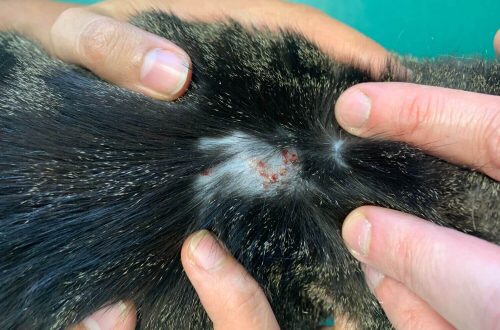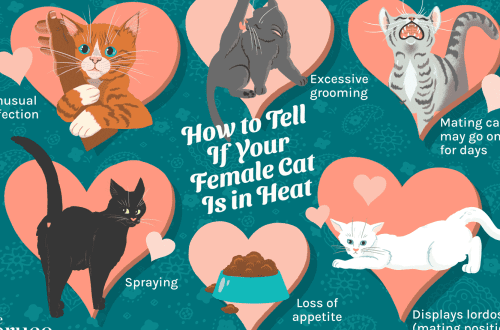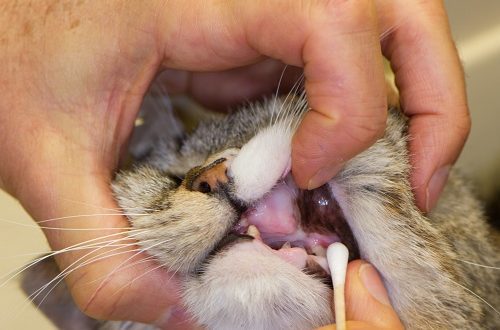
Enteritis in cats – symptoms and treatment

Contents
What is enteritis?
Enteritis (from Latin enteritis) means inflammation of the small intestine. The small intestine has several vital functions:
Mixes the liquid contents (chyme) with enzymes and bile and promotes its promotion to the following digestive sections
Produces the absorption of fluids and nutrients into the body (proteins, fats, carbohydrates, minerals, vitamins)
Produces intestinal hormones (eg, secretin, cholecystokinin, etc.)
Contributes to the immune defense of the body.
Inflammation leads to disruption of all or part of these functions. Enteritis can lead to depression of the general condition, and inflammation can also spread to neighboring organs and tissues. In this article, we will take a closer look at the types, symptoms, and treatment of enteritis in cats.

Causes of enteritis
Various external factors can lead to enteritis in cats. These include viruses, bacteria, parasites, feeding errors. Let’s analyze the most common of them.
Parvovirus enteritis
Parvovirus enteritis is caused by a virus from the Parvoviridae family. In cats, it received the official name panleukopenia, and among the people such a name as distemper has been established. Although this virus has nothing to do with the plague of carnivores. Viral enteritis is highly contagious among cats, infection occurs mainly by fecal-oral and contact routes. When an unvaccinated pet comes into contact with a sick cat, infection will occur with a high degree of probability. The virus has a high lethality, treatment can be difficult and lengthy. Only members of the cat family are affected by this virus. People, dogs and other animals cannot get infected.
Coronavirus enteritis is caused by a virus of the Coronaviridae family. Despite the similar name to the human coronavirus (SARS-CoV-2), these are two completely different viruses that have nothing in common except for the family. Infection is possible only among cats, this virus is not dangerous to humans. Infection most often occurs by the fecal-oral route. In the form of enteritis, it does not pose a great danger, it proceeds mainly chronically. In cats with good immunity, it may not manifest itself at all and remain asymptomatic. The danger of this virus is that when the pet’s immune system is weakened, under severe stress, it can mutate into a form of infectious peritonitis, which is extremely dangerous and, without treatment, is fatal.
Bacterial infections
Some bacteria can also lead to feline enteritis. Salmonellosis is one of them. Salmonella infects many types of animals, including cats, dogs, reptiles, and even humans. The source of infection is mainly contaminated food, but infection is also possible through contaminated care items (bowls, drinking bowls). Healthy cats with strong immune systems are most often immune to infection.

Parasitic infestations
Parasites living in the intestines of a cat also inevitably lead to inflammation. Infection is fecal-oral, or through food (especially through raw meat). The most common are round helminths (for example, toxocara), flat helminths (dipylidia) and protozoa (giardia, coccidia). Helminths live in the intestinal lumen, feed on useful substances, taking them from the body. They also produce toxic waste products of life, which poison the body. The protozoa mainly settle intracellularly, that is, they affect the intestinal tissues and multiply there. Some types of helminths, especially round ones, can be contagious to humans; hygiene must be observed when communicating with a cat. Protozoa are species-specific parasites, that is, they are transmitted from a cat only to other cats.
Alimentary enteritis
Inflammation of the intestines often occurs due to improper feeding of the pet. Such human food is strictly contraindicated for cats: salty, fried, sweet, spicy. It is recommended that cats be fed either a commercially prepared diet or a natural diet formulated in conjunction with a veterinary nutritionist. Any errors in feeding can lead to enteritis and the resulting problems.

Intestinal injury
Injuries can also lead to inflammation of the small intestine. Most often, they occur due to feeding the cat with bones. Raw bones leave the body on their own, but also often lead to injury to the mucosal wall. An even rarer situation is a penetrating lesion of the intestine with a sharp piece of bone. Feeding bones to domestic cats is highly discouraged for the reasons described above. Often in such cases, surgical treatment with the removal of bones is required.
Symptoms of enteritis in cats
Most often, the main symptom of enteritis will be loose stools, sometimes vomiting can also join it.
With parvovirus enteritis, the symptoms are usually very pronounced: refusal to eat, frequent vomiting, watery stools with a fetid odor. The animal very quickly loses fluid from the body and dehydration occurs. Death can occur within a few days without adequate treatment.
With coronavirus enteritis, the symptoms in cats are most often less frightening: the stools are softer, but not watery, vomiting is rare, and general well-being will generally not change.
With parasitic invasions, loose stools can often be noted, especially characteristic is the presence of mucus in it.
Symptoms of improper feeding are always varied – it can be either a single disorder of the stool, or a serious depression of the condition, frequent vomiting, significant dehydration.
Injuries to the intestines are likely to be accompanied by acute pain in the abdomen, vomiting of brown contents or even blood is possible, and the stool may become black.

Diagnostics
First of all, the doctor will ask about the condition of the animal before the moment of illness. What food does the cat eat, what other foods does it receive. He will ask if the vaccination was carried out in the last year, when and with what preparations the parasites were treated, if the pet goes outside, if there is access to other animals.
Next, you will need to tell the doctor when the first symptoms began, and which of them persist at the moment. Another important point is whether they started giving medications at home. During the examination, the doctor will assess the tension of the abdomen, whether the animal has any pain, and measure the body temperature.
Most likely, more research will be needed. A clinical blood test will show the presence of inflammatory and infectious processes in the body, indicate anemia. A biochemical blood test will help evaluate the work of internal organs. For the diagnosis of infectious diseases, the PCR method is most often used, sometimes ELISA and culture are also required. It is most often possible to detect parasites with the help of a laboratory study of feces. An ultrasound examination will help assess the structure of internal organs, identify inflammation of the intestine, and sometimes it is possible to find the site of injury.

Treatment of enteritis in cats
Parvovirus enteritis in most cases will require inpatient treatment in a clinic, as it usually proceeds quite hard. Intravenous droppers are carried out, drugs are prescribed – gastroprotectors, antiemetics, painkillers, antibiotics. The animal is under the constant supervision of doctors, control blood tests, ultrasound of the gastrointestinal tract are performed daily.
Coronavirus feline enteritis, in contrast, is usually treated at home. Depending on the clinical symptoms, sorbents, enveloping, probiotics are prescribed.
Antivirals for cats have not been proven effective and are not usually prescribed in the treatment regimen.
Antibiotics are primarily used to treat enteritis caused by bacterial causes. Antibiotics from the fluoroquinolone group are usually used for salmonellosis.
For the treatment of helminthiases, broad-spectrum anthelmintic drugs (Milbemax, Drontal, Kanikvantel) are prescribed according to the treatment regimen established by the doctor. Enteritis caused by protozoa is treated depending on the detected causative agent of the problem. For example, Fenbendazole is effective against Giardia.
If the cause of enteritis lies in malnutrition, then first of all it is necessary to establish feeding. A veterinary nutritionist is able to create the right balanced diet, taking into account the wishes of the owner and the taste preferences of the pet.
In case of intestinal injuries, surgery is often required to remove a foreign object and suture the injured areas.
Diet
Quite often, if a pet has diarrhea or vomiting due to enteritis, doctors prescribe special therapeutic diets. Many feed manufacturers have such nutrition, for example, Royal Canin Gastrointestinal, Hill’s i / d, Purina EN. They are easily digested, help to bring the state of the intestine back to normal, restore the microflora in it. Usually in the acute period, frequent fractional feeding with wet food or soaked dry food is prescribed. After recovery, feeding is carried out as usual and it is allowed to smoothly return to everyday food.

Symptoms and treatment of enteritis in kittens
In small kittens, any form of enteritis will occur with more significant clinical symptoms than in adult pets. Diarrhea and vomiting quickly lead to dehydration. In the absence of fluid replacement therapy, the kitten can quickly die. Panleukopenia in kittens can have a lightning-fast course and be fatal in 1-2 days. Coronavirus enteritis in kittens often ends with a form of viral peritonitis than in adults. The lack of preventive antiparasitic treatments leads to a decrease in body weight gain, chronic diarrhea and, without treatment, can also end in death. All kittens with acute clinical signs should be treated in a hospital until the condition returns to normal. Home treatment in most cases is insufficient, and kittens die from dehydration.

Prevention
The best prevention of parvovirus enteritis is routine vaccination. You can start vaccination of kittens from the age of 8 weeks, after 3-4 weeks the vaccination of the kitten must be repeated. Further vaccination against parvovirus enteritis is possible 1 time in 3 years. Vaccines against coronavirus enteritis exist, but have not been widely used due to their low effectiveness and are not included in the basic vaccination.
For the prevention of helminthiasis, it is necessary to use anthelmintic drugs at least 2-4 times a year for domestic cats. Prevention of bacterial infections of the intestines and protozoosis (diseases caused by protozoa) is to avoid eating raw meat. It is also strictly not recommended to use certain types of human food and bones in the diet of cats.

Summary
Enteritis is an inflammation of the small intestine, which leads to a violation of its performance.
Enteritis in cats leads to various causes, including infectious, parasitic, alimentary
The main symptom will most often be loose stools, but vomiting, refusal to eat are also possible.
Treatment will depend on the cause of enteritis, sorbents, gastroprotectors, antibiotics are usually prescribed.
Proper feeding, routine vaccinations and prophylactic treatments against parasites can protect your pet from most types of enteritis.
Answers to frequently asked questions





